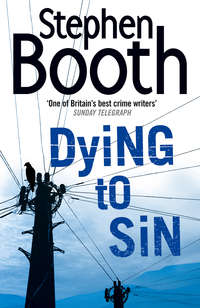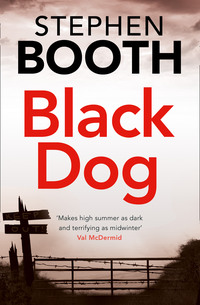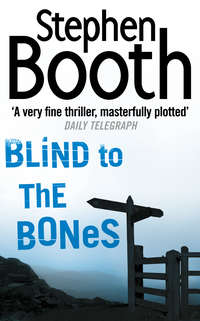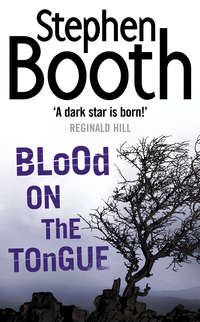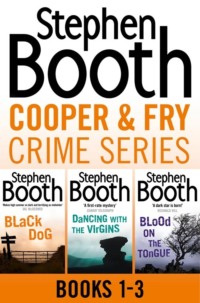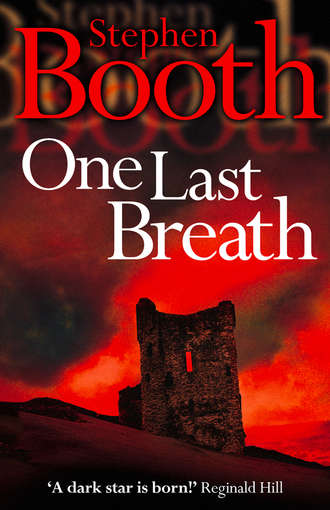
Полная версия
One Last Breath
Amy and Josie were looking at the man and listening with interest.
‘Look, I’m off duty,’ said Cooper.
The security man noticed the girls for the first time. ‘Oh, right. You’ve got your kids with you.’
‘They’re not mine, actually.’
‘I see.’
‘They’re my nieces. My brother’s children.’
Cooper had realized before he even stopped to speak to him that the ex-bobby was just the right age to have worked with his father. He found himself fidgeting immediately, anxious to move on before the reminiscences began, the stories of late turns together as young PCs. Because they would be followed very quickly by the assurances of how much everyone had respected and loved Sergeant Joe Cooper, and how devastated they’d all been when it happened.
It wasn’t so much of a problem at the West Street station in Edendale these days, but the retired coppers were the worst. These were the blokes who had been counting the days and hours until they could collect their full pensions after thirty years’ service. Yet now you would think they’d been forced to leave behind the happiest days of their lives.
‘Must get on,’ said Cooper. ‘Nice to see you.’
‘Hey, these must be Joe Cooper’s grandchildren, then.’
But Cooper just waved and smiled as he put distance between himself and the doorway of Smith’s. Josie had to run to catch up with him.
Cooper thought occasionally of his own old age, though it was usually a brief speculation about whether he would live longer than his father had. He didn’t feel any great desire to be a dad himself. Not just yet, anyway. But when he was old, when he was as helpless as his own mother was now, who would be there to look after him? At the present rate, there would be no one.
But that day was decades away; not something to worry about now. It was only the approach of his birthday that was making him think about ageing. And it wasn’t just any birthday this time, either.
Joe Cooper’s birthday had been in July, too. That meant they shared the star sign of Cancer, the crab in its shell. An astrologer would probably have been delighted that it had taken Cooper so long to move out of Bridge End Farm for a place of his own. A reluctance to leave the family home, a need to cling on to his shell. He would be thirty years old on Saturday, for heaven’s sake.
As for his job, Cooper was sure he’d be asked one day soon to undergo a bit of lateral development and say goodbye to CID for a while. Somebody was going to turn up with a sharp knife to prise him out of his shell.
‘You should have introduced us to that man,’ said Amy. ‘He knew Granddad.’
‘I thought you wanted your lunch?’
‘It wasn’t very polite.’
‘You’re not polite either,’ said Josie to her sister. ‘You say “arse”.’
Cooper wondered for a moment if he was being selfish. He hadn’t wanted to hear a retired bobby’s stories about his father. In fact, he’d been worried that this ex-copper might have been one of those called to the scene of Sergeant Joe Cooper’s death, and would therefore be carrying a picture in his head of the body lying in its pool of blood. He definitely didn’t want to go there.
But Amy and Josie might want to talk about their grandfather with someone who’d known him, someone other than a member of their own family. It might help them understand what had happened.
Cooper shook his head. That was something else he wasn’t going to take responsibility for. Matt could negotiate that minefield himself.
At the corner of High Street and Clappergate, a few yards short of McDonald’s, Cooper saw two of the Hanson brothers across the road. He recognized them without any problem. He’d arrested them himself before now, and in fact had been to school with their oldest brother. These two had failed to answer to bail given them by a lenient magistrates’ bench and had been rumoured to have left Derbyshire altogether, for fear of ending up back inside. Cooper reached automatically for his mobile phone, only now realizing that he had forgotten to switch it back on after the cave rescue exercise.
Then he noticed Amy watching him with the sort of expression that only a child could manage, an expression that came from her natural occupation of the moral high ground when dealing with adults.
‘You’re off duty,’ she said. ‘You’re not supposed to be finding criminals today.’
Cooper looked at her, pausing with his finger on the first button. He was supposed to take the girls to McDonald’s and buy them a Happy Meal before he took them home to Bridge End Farm, preferably safe and uncorrupted.
‘Yes, I know,’ he said. ‘But sometimes they seem to find me. That’s just the way it is.’ And he continued to dial.
5
The bus from Ashbourne to Edendale was almost empty. Mansell Quinn took a seat near a back window, where other passengers couldn’t see him. He watched the scenery gradually change to the familiar White Peak pattern of fields and drystone walls, until a rash of limestone quarries erupted from the landscape near the A6. They were so noticeable on the edge of the national park that Quinn was surprised they were still working.
In Edendale, he went to find the well in Spa Lane. The water still ran from its brass pipe, and people were queuing with plastic containers. A man with a tray of two-litre bottles was collecting gallons of it. Quinn waited until they’d all gone, then bent to take a drink in his cupped hands. He’d expected the water to be cold, like a natural stream. But it was strangely tepid and had a faint mineral tang – not as he’d remembered it at all.
All the way from Sudbury, he’d been building up courage to enter a shop. He’d passed several charity shops on the way to the well, and had noticed that all the assistants were women. As were most of the customers. He was worried that women tended to notice too much.
Then he saw a couple heading towards the door of the Oxfam shop in Clappergate, and he walked in behind them, almost hanging on to their coattails to help him over the threshold. He bought a faded check shirt for two pounds fifty. Encouraged, he moved on, and found a pair of jeans the right size for him in Scope a few doors away.
But he had to choose a coat carefully. He wanted something that was light but rainproof, one with a hood. He’d be outdoors a lot, but he didn’t want to be weighed down by anything too heavy in the hot weather. Quinn had a momentary panic when he realized that the same women he’d followed into Oxfam were also in Help the Aged. But they took no notice of him, and he guessed there must be some kind of circuit that people did of the charity shops. Everyone liked a routine.
In Cancer Research, by the delivery entrance to the Clappergate shopping centre, he found exactly the right thing. It was a black Wynnster stowaway smock, waterproof and breathable, but light enough to roll up and carry. It had a peaked hood and a velcro fastening at the back, a storm flap that buttoned up to his face and a drawstring to pull the hood tight. It must have cost about thirty or forty pounds new. This one had a slight rip down one side and the lining was worn inside the collar, but that wouldn’t bother him. It smelled faintly of oil, as if someone had worn it while working on a car engine. That didn’t worry him either.
And then, at the back of the shop, he came across a small rucksack. It was a dark khaki, not the useless garish colours that he’d seen in the shop windows. This one might have been army surplus stock at some time. It looked as though it dated from the 1950s, but it was well made, sound enough for the use he had in mind.
‘It’s a bit warm for hiking, isn’t it?’
‘What?’
Quinn had his cash ready in his hand, having worked out the total amount before he went to the till. He expected to be able to hand over the money, take his purchases and go, without giving the woman behind the counter anything to remember him by.
‘Hiking,’ she said. ‘Your rucksack and waterproof – I assume you’re going hiking?’
The woman was folding the smock and finding a plastic bag to put it in. She was only making small talk, and Quinn knew there ought to be an answer he could give that she’d think was normal.
‘Yes,’ he said. ‘But not here.’
She looked up at him then, and smiled. Quinn felt she was forcing him to fill the silence.
‘Wales,’ he said.
It was the first place that had come into his head. But he knew immediately it had been the wrong thing to say. If there were reports about him in the newspapers, they might mention he was from Wales.
‘We went there last year,’ said the woman. ‘Aberystwyth. I wouldn’t go hiking in Wales, though. There are far too many mountains for my liking. I’m getting too old for all that.’
She gave him a quizzical look. Quinn knew she was trying to assess his age, and soon she’d be wondering why he was going hiking on his own with an ancient rucksack and a ripped waterproof.
He could feel himself getting angry. The tremors were starting in his hands, his temples throbbed, and he could hear the hissing inside his head – the sound of blood rushing to his brain.
‘Are you going to take the money?’ he said.
He put his notes on the counter and picked up the carrier bag.
‘Wait. You need some change,’ she said.
‘It doesn’t matter.’
Quinn paused outside the shop to check his purchases, afraid that he might have left something behind. Instinct made him look back through the plate-glass window, where the woman who’d served him was standing at her counter. She was watching him. Her look made him feel as if someone had seen straight through him and knew exactly what he was planning to do.
He walked quickly away from the shop. She probably wasn’t even looking at him at all – she was more than likely staring at something behind him across the street, or admiring her own reflection in the window. Then Quinn remembered that it didn’t really matter anyway. By the time he was a hundred yards away, he had calmed down; he began to walk more slowly.
The Vine Inn was still here, anyway. He’d drunk in the pub a time or two, but it was done up now to attract a better class of customer. It had been re-painted, and the chalk boards outside offered specials from a food menu.
Then Quinn noticed the brass plaque fixed to one of the stone flowerbeds outside the pub, and the lettering caught his eye. In memory of Sergeant Joseph Cooper. He stared at the wording, reading it over to himself several times before he looked up and remembered where he was. In memory of Sergeant Joseph Cooper.
At least he could get out of the town now. The last few items on his list wouldn’t be found in any charity shop, so he’d have to go elsewhere. But he had to move on. There were things he had to do. And there wasn’t much time.
On the last leg of his journey, Quinn closed his eyes and tried to rest. By the time he looked out of the window again, he was already in the Hope Valley. The familiar hills gathered close around him, welcoming, drawing him in.
The familiarity of it caught at Quinn’s throat as he got off the bus and walked through a field towards a line of trees. Tiny flies rose from the seedheads of the long grass as he brushed through it. He broke off one of the heads and put it in his mouth to chew. It tasted nutty, but reminded him of oats, too. He thought of a bowl of muesli, and then of sitting at the kitchen table in the morning, pouring milk, smelling coffee, listening to the children getting ready for school.
And then somewhere he heard a gate creak. He was supposed to have fixed the gate. More than fourteen years ago, he’d promised to oil the hinges. That sound alone was enough to take him back to 1990, to wipe away the intervening years as if they’d never existed. The side gate creaked, and here was Mansell Quinn standing listening to it, expecting at any moment to hear his wife’s voice reminding him that he’d promised to attend to it.
Quinn experienced a moment of confusion. He could see himself opening the door of the garage, sighing with exasperation because he’d been distracted from doing something more important. He could picture lifting a can of WD40 from the shelf, coughing at the dust as he moved a box of tools, brushing off an old spider’s web, and noticing the spare set of spark plugs he’d been looking for. He could even remember the texture of the breeze-block wall behind the shelf, and see its colour – pale blue, because they had some paint left over when the kitchen was decorated. He recalled spraying WD40 on the hinges of the gate, and watching the rusted metal darken as the liquid soaked in and began to run. He could smell the alcohol fumes as the spray drifted back into his face.
He’d fixed the gate. Yet still he could hear the creak. It was as if his life had re-started – not from the moment the police came to the house and arrested him, on his last day of freedom, but earlier than that. It was as though he’d walked back into his own life at a point before everything had started to go wrong.
After a few minutes, Quinn straightened up. It wasn’t the same house, or the same gate. His memories had confused him about what was in the past and what was right here in the present.
But there was one memory he knew was real – the one that hadn’t left his mind for the past fourteen years. This one was no mere trick of déjà vu. It was the memory of blood – blood pooling and streaming on a golden field.
It had begun to rain. He hadn’t noticed the clouds gathering, hadn’t even thought to look at the sky. He put on the smock and pulled up the hood. But his face was already wet, and more water dripped on him from the trees.
Quinn had started making his plans two years ago – on the day they told him he’d be making his final move. It had been a morning in early April, a day when the beech trees visible from the exercise yard at Gartree were starting to change their shape and colour, the outline of their naked branches blurring with the suggestion of spring.
‘You’re being transferred to an open prison,’ his wing governor had told him. ‘HMP Sudbury. It’s in Derbyshire. That will be a lot closer to your home, Quinn. It will make it much easier for your family to visit you.’
Quinn had stared at the man as if he were speaking a foreign language. He might as well have been, for all the sense he was making. Quinn waited for the translation, but none came. The governor looked at the file on his desk, but failed to see that Quinn had never received any family visits at Gartree, not once in eight years.
‘Well, aren’t you pleased, Quinn?’
‘Oh. Yes, sir.’
‘You’ll be glad to be out of this place. I know things haven’t always been easy for you here. You went through a bit of a rough patch, didn’t you?’ The governor flicked over a page of the file in front of him. He wasn’t attempting to read it. Not even pretending to. He was just flicking it with his long, white fingers, as if he could consign Quinn’s memories to the past by turning a page, closing a file, sliding it into a drawer of a cabinet. Was it all there, on that one page of his file, summed up in a few paragraphs typed by a Prison Service secretary?
‘A bit of a rough patch. Yes, sir.’
The governor looked at Quinn doubtfully, but relaxed when he saw the prisoner’s calmness.
‘You’ll find life an awful lot easier at HMP Sudbury. And, of course, it’s a step closer to your release.’
He smiled hopefully. But something was happening inside Quinn. His body seemed to be filling with a cloud of poisonous gas that rose from somewhere deep in his guts and coiled through his intestines. It flooded his lungs and seeped into his brain. He waited, terrified, for the cloud to dissipate before he could speak.
‘Thank you, sir.’
Another smile now, different. An ironic smile. ‘That’s provided you’re on your best behaviour, Quinn. You don’t want to end up back here, do you?’
The governor waited a few seconds for a response, then began to get uncomfortable. He closed the file with a little swish and a click. ‘Perhaps it’s something that will take a while to sink in. I understand that, Quinn. If you want to talk to anybody about it, just let Mr Jeavons know, and it can be arranged. You know there are counsellors available. A chaplain, perhaps …’
Quinn tried to shake his head, but the muscles in his neck would hardly move. He felt as though his face had swollen to a monstrous size and was swinging from side to side against the walls of the office, like a hot-air balloon. His skin was on fire and a curtain had dropped in front of his eyes, preventing him from seeing the governor clearly. Yet Quinn remained motionless in his chair, his hands resting on his thighs, as he listened to the sound of the man’s voice.
‘Well, your transfer is set for next week. You can let your family know where you’ll be, so they can visit.’
The voice was distant, like a voice in one of his dreams, the words muffled but menacing.
‘Are you all right, Quinn?’
‘Yes, sir. Thank you, sir.’
‘That’s it, then. You can go now.’
And Quinn had walked back to his cell, hardly aware of the prison officer at his elbow and the doors that closed behind him, or the familiar noises of his block and the voices of prisoners echoing on the landings, like the calls of animals in a distant jungle.
He heard none of them, because his mind was too fully occupied. Quinn had been thinking of all the people who were connected to that time in his past, the people who’d inhabited his dreams for so many years. And he had already been deciding which of them should die.
Rebecca Lowe had taken a breath to scream, but it was too late. The air had been punched from her lungs. She felt as if massive fists were squeezing her chest and emptying her of air like a disused plastic bag.
For a few moments, the shock froze Rebecca’s muscles. Deep in her belly, she could feel her diaphragm twitching helplessly, like a part of her body that had been amputated but refused to die until its nerve endings stopped spasming. The interruption to her oxygen supply made her start to feel light-headed, and she tried to blink away the dark shadows that formed in front of her eyes. A sound came from the back of her throat – a moan that rolled inside her head but failed to reach the air.
Then suddenly she felt her diaphragm muscles spring back into place. They loosened their grip on her lungs, and a draught of air rushed into her chest. The sound it made was like a death rattle, that one last breath before you died. But you never heard your own last breath.
Rebecca Lowe opened her eyes. She realized she was lying on the floor of her kitchen. She could feel the tiles under her back and the dampness soaking through her clothes. She’d washed the floor only an hour before, and the smell of detergent was overpowering. Tentatively, she moved a hand and heard one of her rings click against the tiles. But her hand seemed to be a long way from her face, and she couldn’t understand why her arm should be thrown out at such an awkward angle.
Then she became aware of how much her head hurt. It was as though the oxygen drawn into her lungs had finally reached her head and activated the pain switch, alerting the nerve cells to the message of the impact on the floor, and now they were shrilling like fire alarms. Waves of agony rolled from the back of her head to the front and burst inside her eyes, forcing her to squeeze her eyelids shut against the light.
Rebecca knew that moving her head would only make the pain worse. So she tried to move a leg instead. It seemed to be the furthest and safest part of her body. At first, she couldn’t tell which leg she was moving, because they both were tangled together. But then one leg fell away from the other, flopping on to the floor. It was only when she felt the dampness on her foot that she realized she’d lost one of her shoes. She’d been wearing her flip-flops – a mistake on a damp floor, because their soles were too smooth and slippery.
Automatically, Rebecca began to lift her head to look for the flip-flop. She screamed, and continued to scream as the pain smashed into her brain, bouncing off her skull and surging along her body, ripping through every muscle and nerve. Her head fell back on to the floor, setting off the tide of agony all over again. Her fingers clawed and scrabbled on the tiles, making random patterns in the damp surface. Her stomach heaved and sent streams of bile into her throat. Tears filled her eyes and ran down her cheeks.
Rebecca found that her breathing was ragged and gasping, and she tried to steady it. Somehow, she had to work out what to do. She knew she was badly hurt, and alone in the house. She could call for help, but no louder than she’d already screamed from the pain. She could hear her own scream still echoing in her ears.
The house was nearly airtight and well insulated. No one would hear her unless they were standing right outside her double-glazed window. And the nearest neighbours were three hundred yards away. Rebecca listened for a car on the road, but the only sounds she heard were the wind and the rain.
She knew her one chance was to make it to a phone. But the mere thought of it made her wince in agony. She had no hope of reaching the next room without passing out from the pain and perhaps doing herself more damage. If only she had her mobile phone in her pocket. But she knew it was where she’d left it earlier – in her handbag, on the dining-room table.
Just trying to think made her head hurt. Her tears flowed faster as she realized she might have to wait until somebody came to the house and found her. But she expected to be alone all night, and all day tomorrow.
Slowly, Rebecca became aware that something else was wrong. She thought about her dog, Milly, who had been asleep in the utility room. Milly ought to have woken or reacted in some way to her scream. If she could just have touched the dog, felt her presence nearby, it would have provided a small scrap of reassurance, the company of another living creature.
But there was a silence in the house that didn’t feel right. In the midst of her pain, Rebecca felt that silence nudging her towards some small thing that had been dislodged from her memory by her fall – something she couldn’t quite grasp, because her mind would no longer concentrate properly.
Then she remembered the sound she’d heard just before she fell. It had been the soft cough of the back door opening.
6
There were no lights on at Parson’s Croft when Dawn Cottrill drove up to the house. Not even the security lights, which should have come on when the sensors caught the movement of her car on the drive. That alone was enough to tell her that something was wrong.
Dawn had been trying to phone her sister for the past hour, ever since Andrea had called from London, already in a panic and imagining the worst. Rebecca wasn’t answering either the house number or her mobile. Of course, Andrea had wanted to contact the police straight away, but Dawn had managed to talk her out of it. And now she was regretting it. It was a little too dark up here in Aston, where there was no street lighting and all the houses were screened from the neighbours by trees. Rebecca never forgot to switch on the outside lights at night.
Dawn was well prepared, though. She fumbled in her glove compartment for the torch she always kept in case of breakdowns. It was a pity Jeff was at that conference in Birmingham tonight, because she would have preferred him to be with her. But she ought to be able to do some things on her own, and checking on her sister was one.
Carefully locking the car, she went to the back door of the house. It was the door she always used when she visited her sister, and besides she had a spare key so she could water the plants or feed the dog when Rebecca was away.
Dawn could think of only two possibilities. Most likely, her sister had gone out somewhere and forgotten to take her mobile phone. The garage door was closed, so she couldn’t tell whether Rebecca’s car was there or not. Everyone forgot their mobile now and then. It was even possible to forget your mobile and not remember to switch on the outside lights when you left the house.


